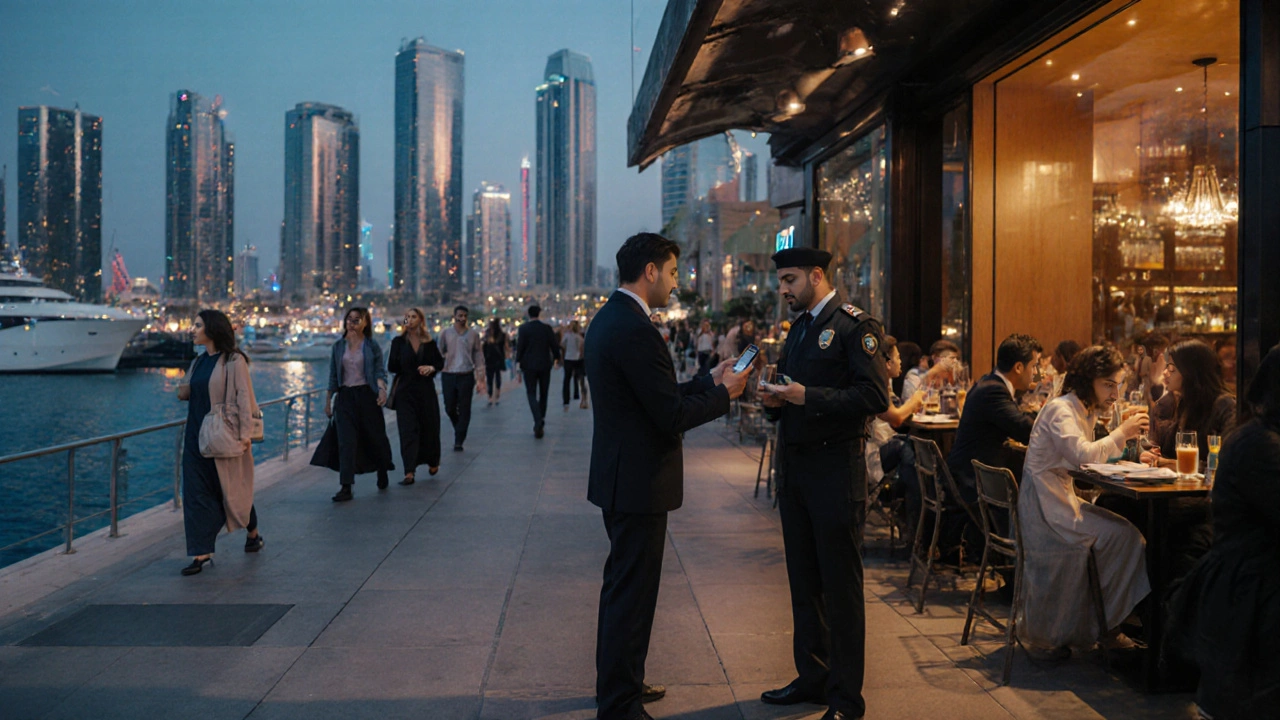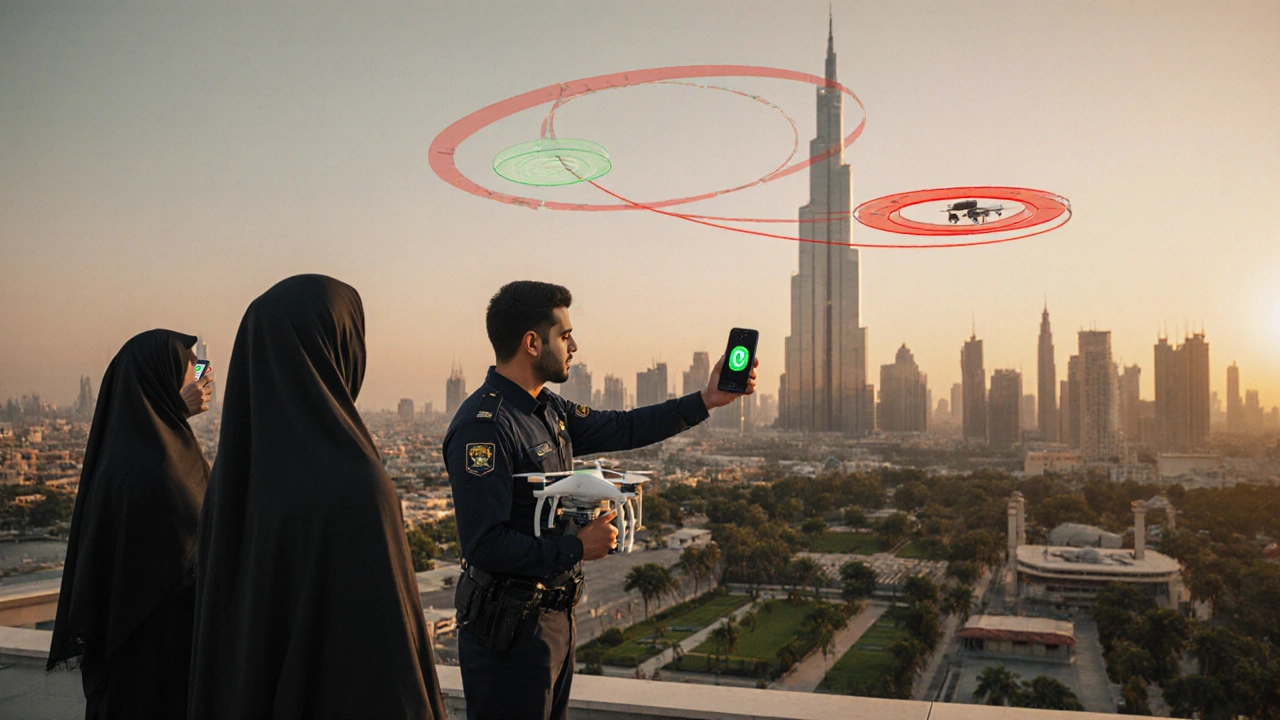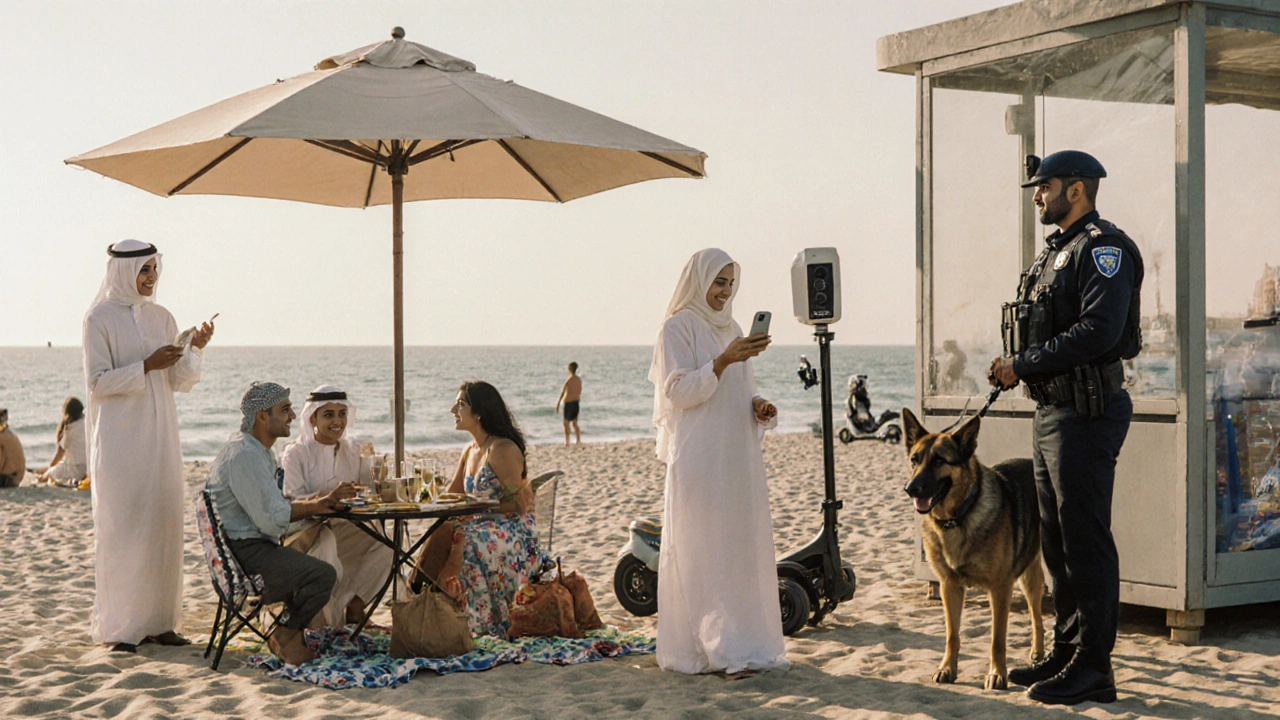
Dubai is a city in the United Arab Emirates with modern tourism, tight safety standards, and clear laws that shape daily life If you know the boundaries-what you can do, what needs a permit, and what to avoid-you’ll have a smooth trip and zero drama.
TL;DR
- Drugs: zero tolerance. Even residue can mean jail or deportation. Some meds need a MOHAP permit.
- Alcohol: legal for 21+ in licensed venues. Public drinking and drunk behavior are illegal. BAC for drivers is 0.0.
- Public decency: dress modestly off beaches/pools; PDA kept low-key; topless sunbathing is illegal.
- Social media: defamation, privacy violations, and “offensive” content can bring heavy fines under cybercrime law.
- Tech: VPNs are legal, but using them to break the law isn’t. Some VoIP apps are restricted.
- Drones and photography: need registration/permission; don’t film people or sensitive sites without consent.
- Ramadan: everyday life goes on; be respectful with food/music in public spaces.
How “restricted” works in Dubai
Dubai follows federal law across the United Arab Emirates-a federation of seven emirates with unified federal laws and some local regulations. Most rules are straightforward: if something touches public order, safety, religion, or privacy, it’s regulated. Dubai’s enforcement is predictable: clear signage, quick fines, and, if needed, court action. The safe mindset? Treat malls like you would a place of worship, beaches like family spaces, and the internet like a public noticeboard.
Three federal pillars matter most to visitors and residents:
- UAE Penal Code (Federal Decree-Law No. 31 of 2021) sets crimes and penalties for public decency, insult, alcohol offenses, and more
- Anti-Narcotics Law (Federal Decree-Law No. 30 of 2021) governs narcotics and psychotropics with strict penalties
- Cybercrime Law (Federal Decree-Law No. 34 of 2021) covers online speech, privacy, defamation, and use of tech to commit crimes
If you remember one phrase, make it this: what’s restricted in Dubai is anything that risks public order, safety, or respect.
Drugs and medications: zero tolerance, specific permits
Dubai’s stance on drugs is strict under the Anti-Narcotics Law. Possession, use, trafficking-any of it-can mean prison and deportation. Even trace residue on clothing or devices can trigger a case. Carrying CBD oil, THC vapes, or cannabis edibles is illegal. Don’t take the risk.
Prescription meds are allowed, but some are controlled. Think codeine, tramadol, and similar opioids or psychotropics. For these, travelers must carry a valid doctor’s prescription, keep meds in original packaging, and, for controlled items, use the permit system of the Ministry of Health and Prevention the federal authority for health regulation, licensing, and medicine import approvals. As a rule of thumb, bring only personal quantities, typically up to 3 months for prescriptions. Check your medication’s status before you fly.
What not to pack: poppy seeds (often in bakery products), any cannabis-derived product, and unlabeled pills. Customs scans are thorough, and Dubai Police enforce the law consistently.
Alcohol: legal in licensed places, but public intoxication is not
Legal drinking age is 21, and alcohol is served in licensed hotels, clubs, bars, and restaurants. Tourists can buy alcohol from licensed retailers using passport ID where applicable, but rules on retail sales to non-residents can shift-check at point of sale. What doesn’t change: drinking in public places (streets, beaches, parks) and being drunk in public are offenses under the Penal Code.
Driving? The legal blood alcohol limit is effectively 0.0. Don’t drive if you’ve had any alcohol. Fines can run high, and vehicles may be impounded. Taxis and ride-hailing are plentiful; use them.
You’ll also see dry zones at some events or public areas; signage is clear. Dubai Police can ask for ID and, if needed, breath-test or detain in serious cases.
Public decency, dress, and behavior
Dubai is relaxed on style but expects modesty off beaches and pools. Swimwear is fine at pools and private beaches; cover up in malls, souks, and government buildings. Topless sunbathing and nudity are illegal.
PDA is common-sense: married couples holding hands is fine; heavy kissing or sexual behavior in public can lead to complaints and penalties under the Penal Code. Abusive language, middle-finger gestures, and public arguments risk fines or arrest. During family hours, staff may ask you to tone it down; take it as a friendly warning.
For issues in public spaces, the first contact is often Dubai Police-the emirate’s law enforcement body responsible for public order, traffic, and crime prevention. Expect polite but firm enforcement.
Social media, photography, and privacy
Posting online falls under the Cybercrime Law. Defamation is a crime in the UAE-it’s not just a civil matter. Publicly shaming someone, insulting a company, or filming a stranger without consent (especially if they’re identifiable) can lead to heavy fines. Filming police, government staff, or accidents and sharing the footage can also get you charged.
Don’t shoot photos of military sites, government buildings, or airport security areas. Even drone-like angles from hotel balconies can raise flags if they capture private properties or people without consent.
Online services and telecom are regulated by the Telecommunications and Digital Government Regulatory Authority-the federal regulator that manages internet policy, VoIP restrictions, and cybersecurity guidance. Expect blocks on pornography, gambling sites, and some unlicensed VoIP apps. Posting religious insults, hate speech, or extremist content is criminal.
VPNs, VoIP, and tech use
VPNs are legal tools. What’s illegal is using a VPN to commit a crime-like running fraud, spreading banned content, or bypassing blocks to provide paid services without a license. If an app is restricted, use an approved alternative rather than trying to force access. It’s safer and cheaper than a fine.
Work tip: If you need video calls, check what your employer or hotel supports. Many hotels and coworking spaces provide licensed services that work out of the box. Don’t test the limits on your personal line.
Drones and aerial photography
Recreational drones must be registered, and flying zones are heavily controlled. The General Civil Aviation Authority-the federal regulator for airspace, aircraft, and unmanned aerial systems sets the national rules. Expect bans near airports, helipads, ports, and residential areas. Filming people or private property without consent adds privacy violations on top of aviation offenses. Penalties can include confiscation and large fines.
If you must fly for work, get proper authorization first. Hotels can’t approve drone flights over their pools or beaches-that’s an aviation matter, not a housekeeping call.

Driving, transport, and micromobility
Dubai roads are strict on speed, tailgating, and lane discipline. Dashcams are common, but don’t publish someone’s plate or face online. Swearing at drivers is a bad idea-it can be charged as public insult.
E-scooters and e-bikes are allowed only in permitted zones and often require helmets. Crossing highways on foot is illegal; use pedestrian bridges and crossings. Taxis, metro, and trams have clear rules (like women-and-children-only cabins in certain metro cars). Respect carriage designations to avoid fines.
Religion, Ramadan, and cultural respect
Dubai is diverse, but Islam is central to public life. You’ll hear the call to prayer, see prayer rooms in malls, and find halal options everywhere. Blasphemy and insulting religion are criminal under the Penal Code.
During Ramadan, normal life continues. Many restaurants serve as usual, and hotels operate normally. Still, be considerate: keep music low in public, avoid eating while standing in queues right in front of those who are fasting, and dress on the modest side in offices and government buildings. If a venue has “Ramadan guidelines,” follow them-it’s also good hospitality.
Relationships, LGBTQ+ issues, and family law touchpoints
Unmarried cohabitation is not criminal, and hotels commonly check in unmarried couples without issue. Public indecency remains illegal, regardless of marital status. Same-sex relationships are not recognized in law; public expressions of same-sex intimacy can lead to legal trouble under public decency and cybercrime provisions. Content that’s considered promoting homosexuality may be restricted by censors. Keep affectionate behavior discreet and avoid provocative posts or public displays.
Airport and customs: what to leave at home
Pack light on anything questionable. Banned or restricted: cannabis products (including CBD and hemp oils), poppy seeds, offensive items, and certain knives. Bring prescriptions and doctor notes for medicines and keep them in original packaging. Pork products are sold in licensed shops but don’t assume you can import them freely-check airline and customs guidance. Nicotine vapes are regulated; THC vapes are illegal. Cash over set thresholds must be declared; honesty at customs saves time.
Duty-free alcohol allowances exist, but if you pass your limit or open bottles in public, you’re in trouble. Keep receipts and leave bottles sealed until you’re at your hotel or home.
Charity, permits, and organizing events
Fundraising without permission is illegal. If you want to run a charity drive, work with a licensed charity or get a permit through the proper channels. Public events, raffles, and promotions need approvals. It’s not red tape for the sake of it; it prevents fraud and protects donors.
Comparison: common activities and their status in Dubai (2025)
| Activity | Status | Permit? | Typical Penalty if Violated | Primary Authority |
|---|---|---|---|---|
| Alcohol in licensed venues (21+) | Allowed | No for consumption; rules vary for retail purchase | - | Dubai Police |
| Public drinking / intoxication | Restricted | - | Fines, possible detention | Dubai Police |
| Drugs (including CBD/THC) | Illegal | - | Prison, deportation | Dubai Police |
| Controlled prescription meds | Restricted | MOHAP permit + prescription | Confiscation, fines, legal case | MOHAP / Customs |
| PDA (light) | Limited | - | Warnings, fines if indecent | Dubai Police |
| Photography of people without consent | Restricted | Consent required | Fines, possible jail under cybercrime | Dubai Police |
| Drones (recreational) | Restricted | Registration/approval | Confiscation, high fines | GCAA |
| VPN use | Allowed | - | Illegal if used to commit crimes | TDRA |
| VoIP on unlicensed apps | Restricted | - | Service blocked; penalties for illegal workarounds | TDRA |
| Topless/nudity at beaches | Illegal | - | Fines, legal action | Dubai Police |
Checklists you can actually use
Before you pack
- Prescription meds: bring the prescription; for controlled meds, apply via MOHAP and carry the permit.
- No CBD, THC, or poppy seeds. Leave “funny” gummies at home.
- Clothing: swimwear for beaches/pools; light layers for malls and offices.
- Drones: register and plan flight zones-if in doubt, don’t pack it.
- Driving: plan for 0.0 BAC. Book ride-hailing if you’ll drink.
On the ground
- Keep PDA low-key. Avoid swearing or rude gestures.
- Ask before filming people; don’t post strangers online.
- Use approved apps for calls. Don’t use a VPN to break rules.
- Drink at licensed venues only. Don’t carry open containers in public.
- During Ramadan: be considerate with food, music, and dress in shared spaces.
Related concepts and connected topics
This sits inside the wider cluster of UAE law and travel. If you’re staying longer, read up on tenancy rules, employment contracts, and company formation (free zones work differently from mainland rules). Narrower topics worth a look: public transport etiquette, marine activities licensing, and content classification for media production. Broader context includes Middle East travel norms, Islamic finance basics (handy if you’re banking locally), and GCC customs regulations for regional trips.
For validation and deeper reading, look to primary sources: Dubai Police for public order guidance; the UAE Ministry of Justice for federal legislation texts; TDRA for telecom and internet policies; GCAA for drone and airspace rules; and MOHAP for medicine import permits. Hotels and venues will also share their house rules-follow them, and you’ll be fine.

Frequently Asked Questions
Can I drink alcohol in Dubai as a tourist?
Yes-if you’re 21 or older, you can drink at licensed hotels, bars, clubs, and restaurants. Public drinking and being drunk in public are offenses under the UAE Penal Code. If you plan to buy retail alcohol, ask the shop about current rules for tourists. Never drive after drinking; the legal BAC is 0.0.
Are VPNs illegal in Dubai?
No. VPNs are legal tools. What’s illegal is using a VPN to commit a crime, including accessing or providing services in ways that violate the Cybercrime Law or telecom regulations. If a calling app is restricted, use an approved alternative rather than trying to bypass restrictions.
What medications are restricted in Dubai?
Opioids and some psychotropics-like codeine and tramadol-are controlled. Carry your prescription, keep meds in original packaging, and for controlled items apply for a MOHAP permit in advance. CBD/THC products are illegal regardless of prescription. Bring only personal quantities (typically up to three months).
Is PDA allowed in Dubai?
Light affection like hand-holding is common. Anything sexual or prolonged kissing in public can trigger complaints and penalties for public indecency. Keep affection low-key in malls, on the metro, and in family areas.
Can I fly a drone for fun in Dubai?
Only with proper registration and in approved areas. The GCAA regulates airspace, and many districts are no-fly zones. Filming people or private property without consent adds privacy violations. Expect confiscation and fines if you fly illegally.
What changes during Ramadan for visitors?
Most venues operate, and many restaurants serve as normal. Be considerate: keep food and music discreet in public during fasting hours, dress modestly in offices and government sites, and follow venue signs. Hotels guide guests on any temporary rules.
Is cohabitation allowed for unmarried couples?
Yes, cohabitation isn’t criminal, and hotels typically check in unmarried couples. Public indecency laws still apply, so keep affection discreet in public spaces.
What about LGBTQ+ travelers-what’s restricted?
Same-sex relationships aren’t recognized in law, and public displays of same-sex intimacy can lead to legal issues under public decency or cybercrime provisions. Keep behavior discreet in public and avoid posting provocative content about sexuality from the UAE.
Can I take photos in malls or at the beach?
Yes, but don’t photograph people without consent, and avoid filming staff or security. Don’t capture government sites, military zones, or airport security areas. Posting someone’s photo online without consent can be charged under the Cybercrime Law.
What are the biggest mistakes first-time visitors make?
Top missteps: bringing CBD products, public drinking, arguing or swearing in public, posting videos of strangers, flying drones near tourist sites, and assuming VPNs can be used to bypass rules. Stick to licensed venues, ask before filming, and use approved tech solutions.
Final tip: if you’re unsure, ask the venue or check primary sources-Dubai Police, TDRA, GCAA, and MOHAP publish clear guidance. When in doubt, choose the respectful option. It always ages well.
Dubai Escort